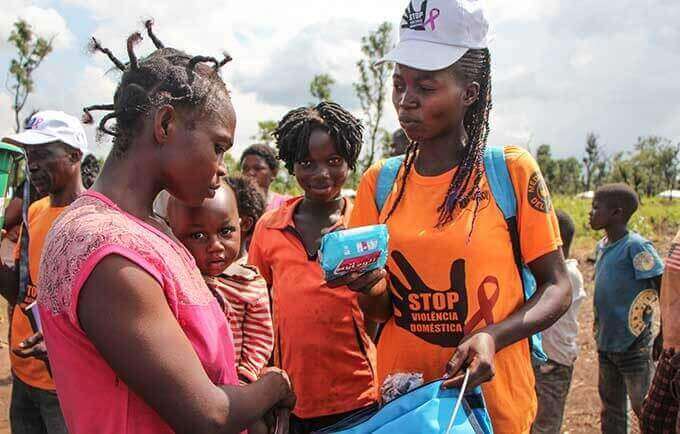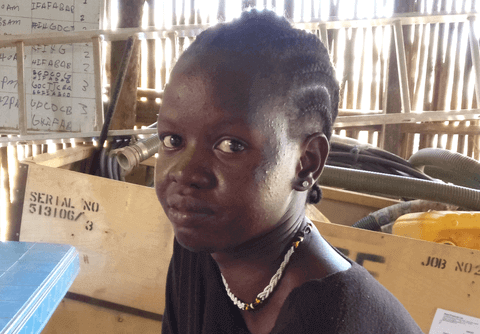Left in the Dark: How Period Taboos Put Women and Girls at Risk

Every day, girls around the world start their first menstrual cycle. A period is a natural and healthy part of a woman’s reproductive health.
For those who are equipped with information, hygiene products, and a supportive community, their first period can be exciting. In Sri Lanka, for example, girls have a Manjal Neerattu Vizha when they begin menstruating. The ceremony is akin to a Sweet 16, Bat Mitzvah, or Quinceañera celebration and includes ceremonies, gifts, and the girl’s family and community.
For other girls, their first period is a nightmare. They may have never had someone explain to them what menstruation is and how their bodies will change during puberty. Some girls may think their lives are in jeopardy or that their periods are a death sentence when they see their own menstrual blood for the first time. Around the world, period taboos and resource limitations prevent girls from managing their periods with dignity.
Left in the dark

Below are some ways that cultural stigmas around menstruation leave girls in the dark about their bodies:
Without knowledge of or access to menstrual hygiene products, girls resort to newspapers and whatever else they can find.
Tampons, disposable and reusable pads, menstrual cups, and absorbent underwear are all products that allow girls to manage their periods. However, many of these products are either not available or are too expensive for girls to use.
Without period products, girls like Nyanjuma use rags that they wash when they can. In Uganda, women experiencing poverty have used banana peels, old newspapers, and leaves.
These items cannot be substitutes for menstrual hygiene products. They leave women susceptible to breakthrough bleeding: bleeding or spotting in between regular menstrual cycles or during pregnancy.
This can result in ridicule or isolation in places where menstruation is already taboo. To avoid being teased or humiliated, many girls stay home from work or school. Girls who stay home four days out of every month for their period miss over a month of school each year. This puts girls who are already less likely to have education opportunities further behind. And, for girls with heavy periods or conditions like endometriosis, a four-day period is short.
Other products for menstruation management, like mild painkillers or hormonal birth control, may be just as inaccessible as hygiene products. This is especially true for women in humanitarian settings who experience menstruation-related issues like endometriosis or polycystic ovarian syndrome (PCOS). These painful conditions affect between 5-10% of women around the world.
UNFPA works to provide menstrual hygiene products to women in emergency settings and also trains community leaders on how to provide comprehensive sexuality education that includes menstrual health information.
Beliefs about impurity leave women vulnerable to infections.
Common period taboos include the idea that women are impure, dirty, or sinful while they’re menstruating. Some women are discouraged from touching or washing their genitals during their periods to eliminate the possibility that they might contaminate the water of a communal bathing area. In reality, menstrual blood is the same as any other body fluid and bathing regularly prevents bacterial infections.
In Syria, UNFPA staff have seen a staggering number of infections in women who do not have access to clean and secure bathing facilities. Curing these infections can be tricky because there are limited antibiotics available and because many Syrians are migrating, making it difficult for health providers to conduct follow-up visits.
UNFPA works in Syria to give women access to hygiene products, treatment for infections, and information on how to better manage menstruation.
The consequences of period poverty
“Period poverty” describes girls who are unable to afford menstrual care products and instead resort to making their own hygiene products or engaging in other activities that will allow them to procure products.
In Kenya, girls have engaged in transactional sex with older men to be able to obtain the items they need. Many of the girls are unaware of the risks of sex, like sexually transmitted diseases, including HIV, pregnancy, or violence that stems from dependence on a partner.
The “pink tax” is another phrase used in relation to the cost of period products. A pink tax describes both taxes on necessary, widely used menstrual hygiene products and price differences between equivalent men’s and women’s products.
The pink tax mostly affects women in countries where access to a variety of personal care products is greater. But, period poverty can affect women everywhere, including in wealthy countries.
UNFPA works to give women access to menstrual health products — including reusable options like menstrual cups, absorbent underwear, and washable pads —that decrease the need for women to rely on others for their menstrual health.
For some girls, their first period ends in marriage.
In some communities, a girl’s first period is seen as a signal that she is ready for marriage and childbearing.
While menstruation is part of the transition into womanhood, no girl is ready for marriage or childbearing at the time of her first period. Girls can begin menstruating as young as 7 or 8 years old or as late as 16 or 17 years old. Either way, child marriage is a human rights abuse that often prevents girls from attending school or marrying the person of their choice.
Child brides are at a much higher risk for early pregnancy than their unmarried counterparts. These girls are more likely to drop out of school, which limits their ability to reach their full potential. Young mothers are twice as likely as other women to experience pregnancy and childbirth complications, like obstetric fistula.
Their bodies, though menstruating, have not fully developed to the point where they can carry a fetus. In fact, pregnancy and childbirth complications are the leading cause of death for teenage girls around the world.
How menstruation and female genital mutilation (FGM) are connected.
Female genital mutilation, or FGM, comes in many forms. In general, it refers to the harmful practice of cutting or removal of a girl’s labia or clitoris. FMG is also sometimes the closing of the vaginal opening with thread or with part of the cut labia. The practice causes a host of health issues in women and girls and is a human rights violation. In some communities, FGM is part of a ceremony that occurs after a girl has had her first period.
Menstruation taboos, child marriage, teenage pregnancy, and FGM all harm girls. When combined, these concepts reinforce gender inequality and perpetuate the idea that girls are less desirable, valuable, or capable than boys.
UNFPA works to end harmful practices around the world by educating communities on the harms of child marriage and FGM and encouraging collective abandonment of the practices.
Chhaupadi exposes women and girls to extreme cold, animal attacks, and sexual violence.
Chhaupadi is a period taboo practiced among some Hindu communities in Nepal and India, in which menstruating women and girls are required to live outside of their home, often in a shack or hut. In more extreme cases, they are barred from interacting with anyone in the community, banned from attending religious ceremonies, prohibited from eating certain foods, and forced to wear special clothes or eat with certain utensils during their period.
Chhaupadi comes from the belief that menstruating women are unclean and that they bring bad luck to a community. The isolation that women and girls experience can have negative psychological effects and fatal consequences.
Women and girls have been known to die from extreme cold or animal attacks while they are living in the menstruation hut. Other times, women and girls have reported experiencing sexual violence while living in the huts, away from family or community members whose presence might have discouraged the violence in the first place.
UNFPA works to end this practice by distributing information about menstrual health and by working with local law enforcement officers. Survivors of violence against women are provided with legal advice, psychosocial services, and medical care.
Around the world, women and girls face isolation, shame, and danger because of misinformation and stigma around their periods.
Around the world, women and girls face isolation, shame, and danger because of misinformation and stigma around their periods.
Menstrual health should be an uncompromised piece of sexuality education. Hygiene products must be affordable and available to ensure that girls are able to manage their periods with dignity.
UNFPA works to destigmatize periods and realize a world where every girl reaches her full potential.